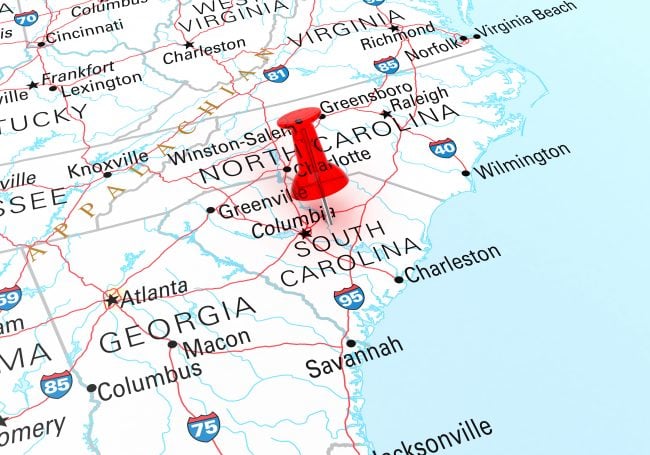 Source: Adobe Stock
Source: Adobe Stock
Billy Boylston is no stranger to the political realm in the Carolinas. A native of Seneca, S.C., he earned a bachelor's degree in political science from South Carolina's Clemson University, served as a staffer for two congressmen, supported candidate and presidential campaigns and worked for a national party convention before joining the Carolinas Credit Union League in 2013 as director of governmental affairs in his home state.
 Billy Boylston
Billy Boylston A decade later, Boylston is settling into a new position as SVP of advocacy for the League. The promotion, which took effect Jan. 1, gave him the reins to build and manage an advocacy team dedicated to protecting and enhancing the credit union charter in both North and South Carolina.
Recommended For You
CU Times recently asked Boylston to share more details about his political background, his 2023 advocacy priorities and how he's approaching his new executive-level role. Responses have been lightly edited for length and clarity.
CU Times: You're currently working to complete an advocacy team at the League. How is that going, and what is your vision for how your advocacy team will be structured?
Boylston: Our mission at the League is to be the leading advocate and catalyst for credit union success in the Carolinas. Our vision is to have a team of experts focused on all areas of government – state, local and political. We look forward to introducing our newly hired federal affairs manager soon while we continue to search for other candidates to build out to the team.
CU Times: What are your top advocacy priorities this year at the League?
Boylston: We have several bills we are working on in state legislatures. In North Carolina, the League continues more than a year of work with our state-chartered credit unions on updates to the NC Credit Union Act. In South Carolina, we also are introducing a bill to update the SC Credit Union Act. Sessions have just started in Columbia and Raleigh, and we are still in talks with various stakeholders on both bills to get to final versions that will be introduced.
CU Times: What federal advocacy issues are credit unions in the Carolinas most concerned about right now?
Boylston: The League and credit unions remain wary of additional interchange regulation, retailer data breaches and member data security, and regulatory red tape. The latest we are preparing to discuss during the CUNA GAC are the CFPB's definition of junk fees, availability and efficiency of CDFI funding and renewed access to the Central Liquidity Facility for credit unions with less than $250 million in assets.
CU Times: At the League, you helped reorganize and improve PAC fundraising efforts through the Carolinas Capital Club. What are some best practices you follow when it comes to PAC fundraising?
Boylston: First, I want to recognize the great work our League accounting team does with our credit unions and PAC reporting vendor. Together, we focus on applying best practices and staying in compliance with federal and state election laws.
One of the most challenging elements we implemented years ago was to work with the HR departments of our credit unions that participate in payroll deduction, which are the source of most of our contributions. We collaborated on a uniform, easy-to-use spreadsheet that they submit electronically in a timely manner. It was important that we recognized and accommodated credit unions' varied capacities, and it has made a big difference in efficiency and compliance from even 10 years ago when credit unions would mail or even fax forms to the League.
CU Times: Can you tell us about your efforts to update the SC Credit Union Act in 2018, 2020 and 2021?
Boylston: I am especially proud of the work we did in 2018 because the SC Credit Union Act had not been updated in over 25 years. We worked hard to overcome banker opposition and facilitate passage of S. 337, which most notably updated field-of-membership rules by defining community groups. It also provided parity with federal credit unions in check-cashing and remittance services for non-members; board meeting participation via conference call or other electronic means; fixed assets; and authority to have charitable donation accounts.
Through 2020 and into 2021, we worked with stakeholders including banking associations to bring passage of S. 467, which made these additional non-controversial changes to improve credit unions' business climate: Simplifying approval/denial of credit union membership; changing the minimum required frequency of board meetings from monthly to quarterly; codifying state law to have an official process of a conversion from a federal to state charter; and changing the required affirmative votes for conversion from two-thirds of membership to a majority.
CU Times: When you joined the Carolinas League, was that your first official role in the credit union industry? What drew you to the credit union world?
Boylston: I began as the director of government relations, focused primarily on the SC State House and assisting with federal affairs. Coming from a background of public service, I was familiar with the work of credit unions, and always appreciated their philosophy of people over profit, and I wanted to be a part of that.
CU Times: What are some of the biggest differences between working directly with congressmen and on political campaigns, and working with the League?
Boylston: There are a lot of similarities and some differences, the most immediate being getting used to sitting on the other side of the table. As a staffer, typically groups are making an ask of your office, and while their issue may not be the most important thing to your office, it is important to them.
From the League's side of the table now, I have learned not only credit union issues, but also how to pivot to the credit union story, illustrating why our issues should matter to congressional offices. This is particularly true for members who don't sit on a financial services committee, or have any direct dealings with credit unions. It is imperative that we stay engaged with members because you never know when they might be able to help.
A great example is Rep. Joe Wilson (R-S.C.), who sits on the Armed Services Committee. For years he has been a supporter but not on a committee of direct jurisdiction. When banks attempted to take away base commanders' authority to give out leases to financial institutions, Rep. Wilson was one of three members on the conference committee. Because we always had a working relationship with him, he signed onto a letter supporting our position and fought for us in the conference committee. Ultimately, we came out victorious, providing yet another example of why every member relationship matters.
CU Times: Who do you credit the most for helping and supporting you along your career journey?
Boylston: There are many who have played a big role, but I have to recognize former Congressman Ted Poe (R-Texas) – better known as "The Judge" – for giving me my first shot. Also, the time I spent with current Rep. Jeff Duncan (R-S.C.) and his team helped better me as a public servant. I also appreciate all the support from the League and our President/CEO Dan Schline for encouraging my professional development, including taking part in Leadership South Carolina and enrolling in the League's 2023 Leadership Development Institute. And as any good southerner, I'd be remiss if I didn't thank my mom and wife for their support of my career.
CU Times: What big-picture impact are you hoping to make through your advocacy work for credit unions in the Carolinas and their members?
Boylston: We all work hard to ensure that our credit unions do not just survive, but thrive in the years to come. We want to have the kind of political influence that brings lawmakers and prospective candidates first to their local credit unions when they want to run for a new or higher office.
In the big picture, I think the Carolinas Credit Union League has a significant role to play with leading the way. We have made substantive updates to our state charters and will seek more. On the federal level, having House Financial Services Committee Chairman Patrick McHenry and Senate Banking Ranking Member Tim Scott gives us opportunity to search for ways to advance credit unions not just at home, but across the nation.
© 2025 ALM Global, LLC, All Rights Reserved. Request academic re-use from www.copyright.com. All other uses, submit a request to [email protected]. For more information visit Asset & Logo Licensing.






